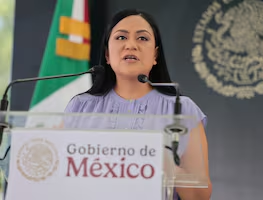Más Información

INE aprueba ampliación presupuestal de 9.2 mdp; se destinará para comprar chalecos en elecciones del Poder Judicial

Sheinbaum anuncia obras de infraestructura en Nayarit; destaca puente que irá de Bahía de Banderas a Puerto Vallarta y un acueducto

Detienen a presunto jefe de célula delictiva allegada a Los Chapitos; se encargaba de narcomenudeo y compra-venta de armamento

“¡Arráncate, Coalcomán!”; así fue la campaña de Anavel Ávila, presuntamente ligada al “Mencho”, para Movimiento Ciudadano

Presupuesto para programas sociales está asegurado en la Constitución: Ariadna Montiel; destaca que se benefician a 320 mil nayaritas

Sheinbaum anuncia construcción de Farmacias del Bienestar en 2025; asegura habrá medicamentos gratuitos para personas vulnerables
Canadian Prime Minister Justin Trudeau on Monday opened talks at the White House with U.S. President Donald Trump, seeking to nurture economic ties while avoiding tensions over issues such as immigration on which the two are sharply at odds.
A smiling Trudeau warmly shook Trump's hand on arrival for what were his first talks there since the president assumed power on Jan. 20.
Trudeau has taken a low-key approach toward Trump, a Republican who campaigned on a pledge to toughen U.S. immigration policies and renegotiate the North American Free Trade Agreement (NAFTA) among Canada, the United States and Mexico.
Trudeau will start his four-hour visit to the White House by holding a private meeting with Trump. Aides will then join the talks before the two men meet female executives and have lunch before addressing a news conference at 2 p.m. Eastern Time.
Trudeau told reporters on Friday he expected the two would "find a lot of common ground."
He also said he would look to "defend and demonstrate Canadian values," but do so "respectfully and not from an ideological standpoint."
Trump's vow to renegotiate NAFTA has unnerved Canadian officials, even though he has singled out Mexico in his criticism of the free trade deal. Canada sends 75 percent of its exports to the United States.
Canadians have become more supportive of NAFTA since Trump's election victory on Nov. 8, a poll from the Angus Reid Institute showed on Monday. Forty-four percent of the 1,508 surveyed said NAFTA had benefited Canada, up from 25 percent from a poll last June.
Trudeau had a strong rapport with former Democratic President Barack Obama, prompting pundits to describe their relationship as a "bromance."
Soon after Trump put a hold on allowing refugees into the United States and temporarily banned travelers from seven Muslim-majority countries in an executive order on Jan. 27, citing the need to head off attacks by Islamist militants, the Canadian prime minister took to Twitter to say refugees were welcome in Canada.
'POLICY OF LAYING LOW'
Still, analysts said Trudeau has strong incentives to build a relationship with Trump given rising anti-trade sentiment.
"You don't have to be a genius to see there are some stark differences between them," said Duke University professor Stephen Kelly, former U.S. deputy chief of mission to Ottawa.
"But is this the time to be poking people in the eye? I would say it is not. ... In some ways the president is a guy for whom personal relationships may be even more important."
Canadian pollster Nik Nanos said Trudeau, who remains popular at home more than a year after winning a surprise Liberal majority government, faces the same pressure all Canadian leaders do when they engage with U.S. presidents: keep the economic ties tight but do not appear too chummy or subordinate.
Nanos expects that Trudeau, if asked, will speak about how Canada is welcoming refugees or seeking to expand free trade, without saying anything critical about Trump's point of view, conscious that the president has not hesitated to take an aggressive tone with other world leaders.
"This meeting is more about avoiding pitfalls than trying to engage on some of the big issues," Nanos said. "It's definitely the policy of laying low."




